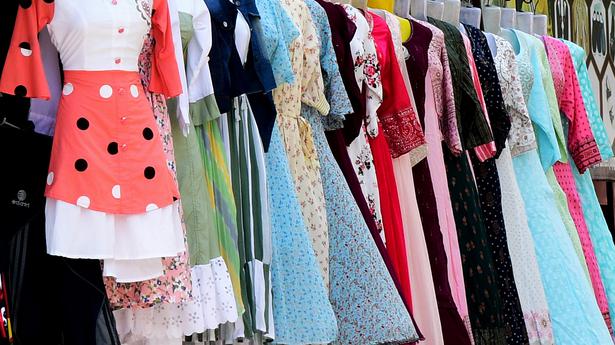
Textile and clothing turn expensive
The Hindu
The steep hike in cotton and yarn prices drives up the prices as high as 30%-40%
Radha (name changed) went to Gani Market in Erode on Friday to buy a few essential items of clothing for her family. While the shopkeeper quoted ₹140 for a product, she wanted it for ₹90. Unable to get it at such a low price, she went to another shop.
“The wholesale price of basic garments, like banian, has increased from ₹90 to ₹140 a piece in the last four months. But customers ask for the old rate. We cannot sell at such a low price and so they go back without buying anything,” says K. Selvaraj, president of the Gani market weekly textile traders’ association. According to him, business has dropped 50% in the last four months because of the steep hike in the prices of textile goods.
The price rise varies from product to product, going up 30% to 40% for many items. This is because of the steep hike in cotton and yarn prices. Various reasons are cited for the prices of cotton and yarn to increase. But it is hurting customers and the industry, he says.
The traders at the market, numbering over 200, have wholesale trade from Monday to Wednesday every week and retail business on other days. “We used to do business worth ₹5 crore from Monday to Wednesday. Now, it is not even ₹1 crore. So we are reducing the goods we purchase from the manufacturers,” he says.
According to the South India Hosiery Manufacturers Association in Tiruppur, of which members supply hosiery products across the country, the prices of hosiery goods are up 30% since January. “It is a question of survival now. Orders are reducing and even if there are orders, the manufacturers are reluctant as they do not know how much the raw material prices will increase,” says one of its members.
R. Nandagopal, a garment exporter and president of Power Table Owners’ Association, says customers shop for half-a-dozen to one dozen pieces when they buy essential garments. Now they buy two or three pieces because of the high price. The agents who take the goods from the manufacturers are not paying on time because they have stocks piling up.
In the case of exports, the manufacturers are unable to quote prices and buy yarn for the order without getting confirmation from the buyers. “Workers at my unit used to work 12 hours a day and on Sundays. We used to recruit regularly. Now, there is work for just eight hours a day and Sundays are holidays. There are no new recruitments,” he says.













